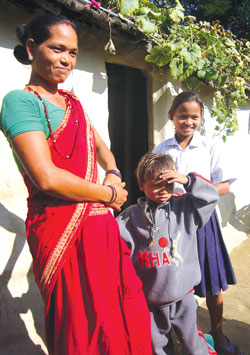|
|
Maaghi, the start of the new year for the Tharu community, is a time for new ventures. Promises and deals are made good on during the festival, including the decision to send girls to work as kamlaris-girl-child indentured labourers-for the next year.
"The girls have to be rescued during Maaghi, otherwise even a verbal agreement to make them kamlaris has to be honoured," explains Krishna Kumar Chaudhary, president of Social Welfare Action Nepal (SWAN), a local group working in the Deukhuri area in Dang. Besides active intervention, the project also focuses on education, awareness, and livelihood and income-generating activities, because poverty is a major reason that Tharu girls between eight and 14 are more or less sold into work, mostly as domestic help.
Until this Maaghi on 15 January, over 1,400 girls from Dang were working as kamlaris. Estimates of kamlaris from all five western Tharu districts including Banke, Bardia, Kailali, and Kanchanpur, range from 20,000 to 25,000.
The Nepalese Youth Opportunity Foundation (NYOF), along with PLAN, SWAN, Friends of Needy Children (FNC) and local clubs, is behind a major push to abolish the kamlari practice in Dang. Som Paneru, executive director of NYOF, says over 480 girls have returned to their families this Maaghi. With numbers still coming in from more remote areas, the organisations expect about 200 more.
The challenge is providing community support and opportunities for the girls, as the project only has provisions for about half of them. Still, Paneru is confident that progress is being made. "Within the Deukhuri and Dang valleys, the practice is almost completely gone," he says, "but it's still going on in the other four districts"
Even with assistance, breaking the cycle of desperate need and old traditions is an uphill battle. In Pipari, Sisanaya VDC, Sita Chaudhary says her daughter Laxmi (pictured above), now 11, left home at the age of six to become a kamlari without consulting her parents, lured by promises that in exchange for babysitting she'd get Rs 5,000 a year and get to watch tv. Instead, she washed dishes in a hotel in Pyuthan for Rs 2,000. "They didn't feed her well, her hair had all come out from where they'd pulled it," says Sita, who herself worked as a kamlari for
12 years from the age of seven.
Forty former kamlaris are enrolled in a 14-month alternative education program in nearby Lalmatiya. However, on a Wednesday two weeks ago, nearly half the older girls hadn't come to class because the jungles were open for firewood and fodder collection. Seema Chaudhary, 14, and her sisters Sushila, 16, and Basanti, 20, were all sent by their father to work as kamlaris. When asked what they do at home after class, they giggle and say their chores-washing clothes and dishes-are almost the same, but they also have to cut grass and mind their younger siblings.



